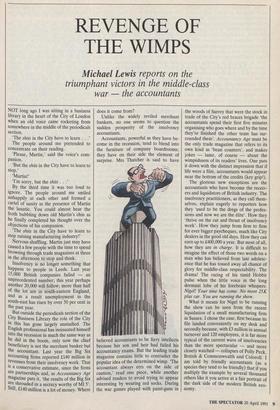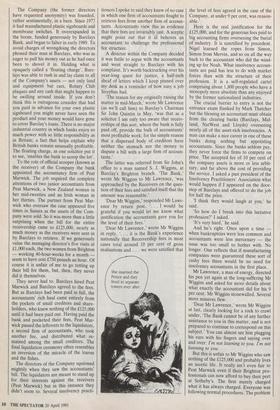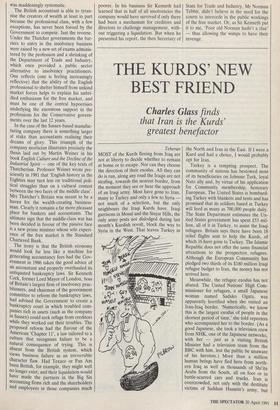REVENGE OF THE WIMPS
triumphant victors in the middle-class war — the accountants
NOT long ago I was sitting in a business library in the heart of the City of London when an old voice came rocketing from somewhere in the middle of the periodicals section.
'The shits in the City have to learn . . The people around me pretended to concentrate on their reading.
'Please, Martin,' said the voice's com- panion.
'But the shits in the City have to learn to stop.'
'Martin!'
'I'm sorry, but the shits . .
By the third time it was too loud to ignore. The people around me smiled unhappily at each other and formed a cartel of sanity in the presence of Martin the lunatic. You could almost hear the froth bubbling down old Martin's chin as he finally completed his thought over the objections of his companion.
'The shits in the City have to learn to stop ruining manufacturing industry!'
Nervous shuffling. Martin just may have caused a few people with the time to spend browsing through trade magazines at three in the afternoon to stop and think.
Insolvency is no longer something that happens to people in Leeds. Last year 15,000 British companies failed — an unprecedented number; this year perhaps another 20,000 will follow; more than half of the lot are in south-eastern England, and as a result unemployment in the south-east has risen by over 50 per cent in the past year.
But outside the periodicals section of the City Business Library the role of the City in this has gone largely unstudied. The English professional has insinuated himself into the recession in much the same way as he did in the boom, only now the chief beneficiary is not the merchant banker but the accountant. Last year the Big Six accounting firms reported £140 million in revenues from their insolvency work. That is a conservative estimate, since the firms are partnerships and, as Accountancy Age magazine puts it, 'the results of the Big Six are shrouded in a secrecy worthy of MI 5'. Still, £140 million is a lot of money. Where
does it come from?
Unlike the widely reviled merchant bankers, no one seems to question the sudden prosperity of the insolvency accountants.
Accountants, powerful as they have be- come in the recession, tend to blend into the furniture of company boardrooms; they have on their side the element of surprise. Mrs Thatcher is said to have believed accountants to be fiery intellects because her son and heir had failed his accountancy exams. But the leading trade magazine contains little to contradict the popular idea of the determined wimp. 'The accountant always errs on the side of caution,' read one piece, while another advised readers to avoid trying to appear interesting by wearing red socks. During the war games played with paint-guns in
the woods of Surrey that were the stock in trade of the City's red braces brigade 'the accountants spend their first five minutes organising who goes where and by the time they're finished the other team has sur- rounded them'. Accountancy Age must be the only trade magazine that refers to its own kind as 'bean counters', and makes jokes — lame, of course — about the wimpishness of its readers' lives. One puts it down with the distinct impression that if life were a film, accountants would appear near the bottom of the credits (key grip!).
The glorious new exceptions are the accountants who have become the receiv- ers and liquidators of British industry. The insolvency practitioners, as they call them- selves, explain eagerly to reporters how they 'used to be the dregs of the profes- sions and now we are the elite'. How they 'thrive on the cut and thrust of insolvency work'. How they jump from firm to firm for ever bigger paycheques, much like City dealers in the good old days. How they can earn up to £400,000 a year. But most of all, how they are in charge. It is difficult to imagine the effect of those two words on a man who has believed from late adolesc- ence that he has tossed away all chance of glory for middle-class respectability. The drama! The racing of his timid Hobbit pulse when the little voice in the long dormant lobe of his forebrain whispers: Nigel! Your time has come. No more 25K plus car. You are running the show.
What it means for Nigel to be running the show can be seen from the recent liquidation of a small manufacturing firm in Sussex. I chose the case, first because its file landed conveniently on my desk and secondly because, with £3 million in annual turnover and 120 employees, it is far more typical of the current wave of insolvencies than the more spectacular — and more closely watched — collapses of Polly Peck, British & Commonwealth and Coloroll. I am told by friendly accountants (as a species they tend to be friendly) that if you multiply the example by several thousand others like it you arrive at a fair portrait of the dark side of the modern British eco- nomy. The Company (the former directors have requested anonymity) was founded, rather sentimentally, in a barn. Since 1977 it had manufactured plastic signboards and membrane switches. It overexpanded in the boom, funded generously by Barclays Bank, and began to falter in early 1989. To avoid charges of wrongdoing the directors phoned their man at Barclays, who was as eager to pull his money out as he had once been to shovel it in. Holding what is opaquely called a 'floating charge', Barc- lays was able to rush in and lay claim to all of the Company's assets — not only land and equipment but cars, Rotary Club plaques and any cash that might happen to be swilling around inside. If you don't think this is outrageous consider that had you paid in advance for your own plastic signboard you might never have seen the product and your money would have gone to cover Barclay's loans. There is no major industrial country in which banks enjoy so much power with so little responsibility as in Britain; a fact that helps explain why British banks remain unusually profitable. The floating charge, as one solicitor put it to me, 'enables the bank to scoop the lot'.
To the role of official scooper (known as the receiver) of the Company the bank appointed the accountancy firm of Peat Marwick. The job required the complete attentions of two junior accountants from Peat Marwick, a New Zealand woman in her mid-twenties and an Irish woman in her thirties. The partner from Peat Mar- wick who oversaw the case appeared five times in Sussex as the assets of the Com- pany were sold. So it was more than a little surprising when the bill for the entire receivership came to £125,000, nearly as much money as the receivers were sent in by Barclays to retrieve. If we generously value the managing director's five visits at £1,000 each, the two women from Brighton — working 40-hour-weeks for a month seem to have cost £750 pounds an hour. Of course it is unfair of me to go totting up their bill for them, but, then, they never did it themselves.
They never had to. Barclays hired Peat Marwick and Barclays agreed to the fees. But as Barclays had been paid in full, the accountants' rich haul came entirely from the pockets of small creditors and share- holders, who knew nothing of the £125,000 until it had been paid out. Having paid the bank and pocketed their fees, Peat Mar- wick passed the leftovers to the liquidators, a second firm of accountants, who took another fee, and distributed what re- mained among the small creditors. The final liquidation ceremony often resembles an inversion of the miracle of the loaves and the fishes.
The directors of the Company squirmed mightily when they saw the accountants' bill. The liquidators are meant to stand up for their interests against the receivers (Peat Marwick) but in this instance they didn't seem to. Several insolvency practi- tioners I spoke to said they knew of no case in which one firm of accountants fought to retrieve fees from another firm of accoun- tants. Accountants view this as evidence that their fees are invariably just. A sceptic might point out that it ill behoves an accountant to challenge the professional fee structure.
A director within the Company decided it was futile to argue with the accountants and went straight to Barclays with his complaint. It's worth backtracking over his year-long quest for justice, a half-inch sheaf of letters which I keep pinned over my desk as a reminder of how easy a job Sisyphus had.
'The reason for my originally raising the matter in mid-March,' wrote Mr Lawrence (as we'll call him) to Barclay's Chairman Sir John Quintin in May, 'was that as a solicitor I am only too aware that receiv- erships of this sort, where the bank is fully paid off, provide the bulk of accountants' most profitable work; for the simple reason that a dispersed body of creditors have neither the stomach nor the money to dispute a bill with a large firm of accoun- tants.'
The latter was referred from Sir John's office to a man named S. J. Wiggins, at Barclay's Brighton branch. 'The Bank,' wrote Mr Wiggins to Mr Lawrence, 'was approached by the Receivers on the ques- tion of their fees and satisfied itself that the amount was reasonable.'
'Dear Mr Wiggins,' responded Mr Lawr- ence by return post, '. . . I would be grateful if you would let me know what justification the accountants gave you for the level of their fees.'
'Dear Mr Lawrence,' wrote Mr Wiggins in reply, . . it is the Bank's experience nationally that Receivership fees in most cases total around 10 per cent of gross realisations and . . . we were satisfied that the level of fees agreed in the case of the Company, at under 9 per cent, was reason- able.'
Here is the real justification for the £125,000, and for the generous fees paid to big accounting firms overseeing the burial of industry. It is sanctified by precedent. Nigel learned the ropes from Simon, Simon from Mervin, and so on all the way back to the accountant who did the wind- ing up for Noah. What insolvency accoun- tants are paid has less to do with market forces than with the structure of their profession. It is a self-regulated cartel comprising about 1,800 people who have a monopoly more absolute than any enjoyed by the former nationalised industries.
The crucial barrier to entry is not the entrance exam flunked by Mark Thatcher but the blessing an accountant must obtain from the clearing banks (Barclays, Mid- land, NatWest and Lloyds) overseeing nearly all of the asset-rich insolvencies. A man can make a nice career in one of these banks doing nothing but appointing accountants. Since the banks seldom pay, they never force the firms to compete on price. The accepted fee of 10 per cent of the company assets is more or less arbit- rary, and far above the cost of providing the service. I asked a past president of the Insolvency Practitioners' Association what would happen if I appeared on the door- step of Barclays and offered to do the job for half the price.
'I think they would laugh at you,' he said.
'So how do I break into this lucrative profession?' I asked.
'It's very hard,' he said.
And he's right. Once upon a time when bankruptcies were less common and accountants were less mercenary — the issue was too small to bother with. No longer. One reflects that if manufacturing companies were guaranteed these sort of cushy fees there would be no need for insolvency accountants in the first place.
Mr Lawrence, a man of energy, directed his pen yet again at the long-suffering Mr Wiggins and asked for more details about what exactly the accountant did for his 9 per cent. Mr Wiggins stonewalled. Several more missives flew.
'Dear Mr Lawrence,' wrote Mr Wiggins at last, clearly looking for a rock to crawl under, 'The Bank cannot be of any further assistance to you in this matter, and is not prepared to continue to correspond on this subject.' You can almost see him plugging his ears with his fingers and saying over and over: I'm not listening to you. I'm not listening to you.
But this is unfair to Mr Wiggins who saw nothing of the £125,000 and probably lives an ascetic life. It really isn't even fair to Peat Marwick even if their Brighton pro- fessionals can now afford to buy their port at Sotheby's. The firm merely charged what it has always charged. Everyone was following normal procedures. The problem was maddeningly systematic.
The British accountant is able to tyran- nise the creators of wealth at least in part because the professional class, with a few exceptions, has never been forced by the Government to compete. Just the reverse.
Under the Thatcher governments the bar- riers to entry in the insolvency business were raised by a new set of exams adminis- tered by the profession and a shrinking of the Department of Trade and Industry, which once provided a public sector alternative to insolvency practitioners.
One reflects (one is feeling increasingly reflective) that the ability of the English professional to shelter himself from unkind market forces helps to explain his unbri- dled enthusiasm for the free market, and must be one of the central hypocrisies underlying the enormous support in the professions for the Conservative govern- ments over the last 12 years.
In the case of the Sussex-based manufac- turing company there is something larger at stake than accountants realising their dreams of glory. This triumph of the company mortician illustrates precisely the thesis laid out by Martin Weiner in his book English Culture and the Decline of the Industrial Spirit — one of the key texts of Thatcherism. Professor Weiner wrote pre- sciently in 1981 that 'English history in the Eighties may turn less on traditional poli- tical struggles than on a cultural contest between the two faces of the middle class'. Mrs Thatcher's Britain was meant to be a haven for the wealth-creating business- man. Clearly it remains a far more pleasant place for bankers and accountants. The ultimate sign that the middle-class war has been decided in favour of the passive face is a new prime minister whose sole experi- ence of the free market is the Standard Chartered Bank.
The irony is that the British economy would look far less like a machine for generating accountancy fees had the Gov- ernment in 1986 taken the good advice of an accountant and properly overhauled its antiquated bankruptcy laws. Sir Kenneth Cork, former Lord Mayor of London, boss of Britain's largest firm of insolvency prac- titioners, and chairman of the government committee to reform the bankruptcy laws, had advised the Government to create a bankruptcy court in which troubled com- panies rich in assets (such as the company in Sussex) could seek refuge from creditors while they worked out their troubles. The proposed reform had the flavour of the American 'Chapter 11', a law tailored to a culture that recognises failure to he a natural consequence of trying. This is absent from the British system, which views business failure as an irreversible character flaw. Had Texaco or Pan Am been British, for example, they might well no longer exist; and their liquidation would have made the partners in the Big Six accounting firms rich and the shareholders and employees in those companies much poorer. In his business Sir Kenneth had learned that in half of all insolvencies the company would have survived if only there had been a mechanism for creditors and directors to challenge management, with- out triggering a liquidation. But when he presented his report, the then Secretary of State for Trade and Industry, Mr Norman Tebbit, didn't believe in the need for the courts to intercede in the public workings of the free market. Or, as Sir Kenneth put it to me, 'Poor old Norman hadn't a clue' — thus allowing the wimps to have their revenge.




























































 Previous page
Previous page